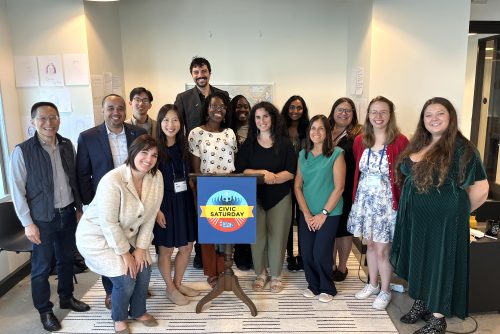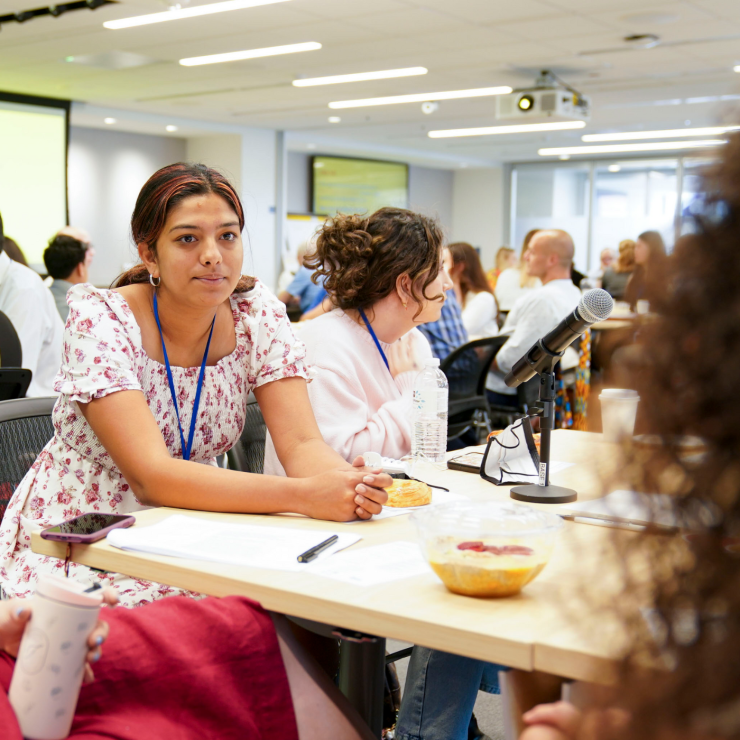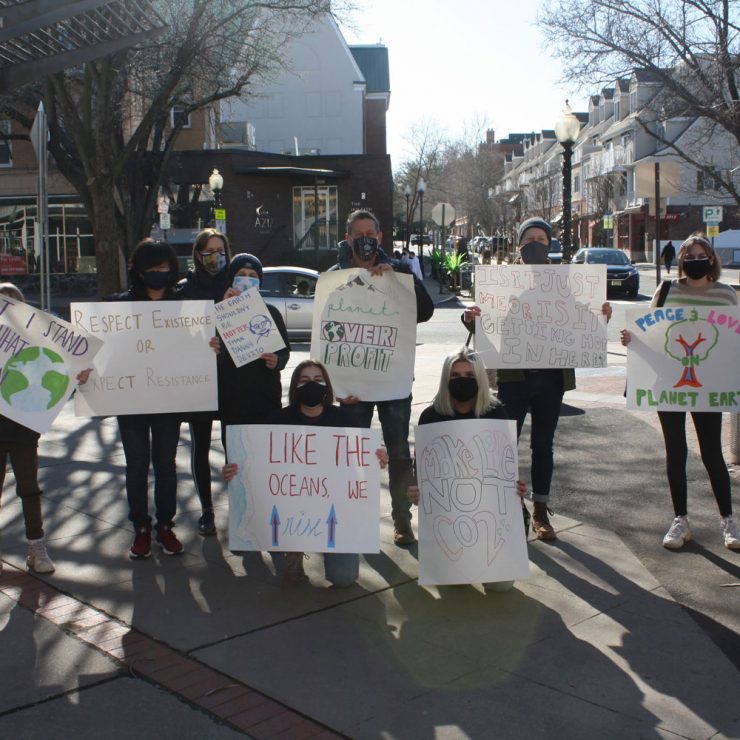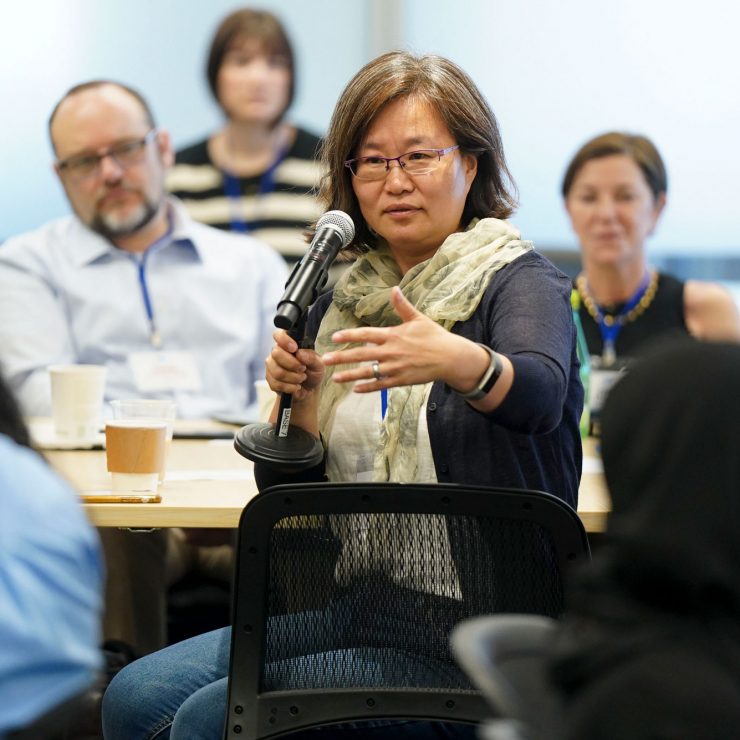 This post is written by Civic Saturday Fellow and aspiring physician, Sindhu Dwarampudi. She lives in Suwanee, GA.
This post is written by Civic Saturday Fellow and aspiring physician, Sindhu Dwarampudi. She lives in Suwanee, GA.
In a world that can seem divisive, Fred Rogers of Mister Rogers’ Neighborhood described the ripple effect that even small acts of kindness can have: “Imagine what our real neighborhoods would be like if each of us offered, as a matter of course, just one kind word to another person.” Often, the first step boils down to truly getting to know the people around you.
Growing up in an incredibly diverse neighborhood in Suwanee, GA, I was able to learn from people with such varied lived experiences. However, I also realized that despite living side by side, we were becoming increasingly isolated in our own worlds. With demands from familial, professional, and personal responsibilities, it seemed that there was a growing disconnect between neighbors. They were left with little time or energy to have genuine conversations with one another.
My experience is hardly unique. The times we live in are characterized by loneliness, polarization, and the spread of misinformation. Now more than ever, it is imperative that we engage in authentic conversations about pressing issues rather than settling for superficial exchanges. Despite what we may be going through on a personal level, having the ability to relate to each other with respect and love is exactly what we need at this moment.
Creed and commitment
The Civic Saturday Fellowship at Citizen University provided me with the invaluable tools and inspiration to bring to life this idea of a more connected community. Civic Saturdays serve as a civic counterpart to a faith gathering, pulling a community together to embrace a sense of collective purpose through shared activities like singing together, hearing texts of different times, engaging with a sermon, and participating in discussion.
During Civic Seminary in Seattle, Eric Liu shared how in America, we are not bound by a common race, ethnicity, religion, or language. We only have a common creed, the set of ideals for our country that has not yet been realized, to hold us together. Therefore, no matter how things play out on a global scale, it is up to us to commit to living like responsible citizens in our day to day lives by contributing meaningfully to the places and people we have lived and learned from. Only then can we get closer to closing the gap between the creed and deed.
It is up to us to commit to living like responsible citizens in our day to day lives by contributing meaningfully to the places and people we have lived and learned from.
The power of invitation
I am immensely grateful for the insightful guidance and unwavering support I received from the Citizen University team as I prepared to facilitate gatherings. I was also deeply inspired by my fellow cohort members, who were each passionate and committed to making a difference in their own communities. Feeling empowered to bring the concept of Civic Saturdays back home, I envisioned these gatherings as opportunities for neighbors, friends and strangers alike, to come together and over time, meaningfully engage to support the community in their own way. Civic Saturdays begin with an invitation to people to attend with open hearts and minds.
Prioritizing personal and intentional invitations has given me the greatest success. Depending on the individual situation, I called, texted, and met in-person to discuss Civic Saturday. It was always the greatest joy to see people that I had talked with directly show up to the gathering with their loved ones. Some people who were particularly invested in the gathering reached out to invite those in their own circles, which was extremely helpful in building trust and spreading the word further. Extending invitations, especially on a personal level, is definitely made easier when you have the support of a group.
Beyond simply sharing information, the details for the gathering, and requesting their presence, I have realized the significance of structuring the invitation to ensure that neighbors feel valued and contribute to something meaningful. This was how one neighbor ended up sharing his musical talent during our gatherings, while others participate wholeheartedly in readings as they feel comfortable. With time being the most valuable thing anyone can give to others, they need to know that their voice and participation matters.
I have realized the significance of structuring the invitation to ensure that neighbors feel valued and contribute to something meaningful.
Inviting others is not always easy. The fear of your invitation being rejected can be daunting, but it is crucial to not let this hinder your efforts. Some of my invites have inevitably been met with indifference, but it has been worthwhile to remember that this is not personal. Recognizing that many are waiting to be invited has also increased my confidence when extending invites. When an invite reaches the right person and an initial connection forms, its impact far outweighs any uncertainty I have had up until that point.
Purpose leads to possibility
Even though I share the sentiment of reaching more people, quality is better than quantity in this case. Having smaller groups for my first two gatherings has been wonderful for people to get to know each other in a more intimate setting; it has also helped me to feel more comfortable and develop my own presence. It is important to consider the purpose of your gathering, but starting on a smaller scale can be beneficial for all involved. Creating small mindset shifts in our little corner of the world can have unimaginable impact on a wider scale.
People who would not have normally crossed paths were able to convene, break bread together, and have spirited discussions.
Through these gatherings, I have witnessed my neighbors, from different cultures and different generations, engage in conversations that have allowed us to rebuild faith in one another. People who would not have normally crossed paths were able to convene, break bread together, and have spirited discussions. They reported feeling inspired by one another and committed to various action steps in their own lives, from checking in with an elderly neighbor to organizing a community potluck. This has only been possible due to reaching out with that first invitation.
We must embrace the power of invitation.
To reach a point where we truly feel at home in our communities and see empathy being extended beyond immediate circles, we must embrace the power of invitation. It takes courage to lean on our support system and invite people to join us, but it is also extremely rewarding. Although seemingly simple, it acts as the building blocks for neighbors to get to know each other, strengthening communities and ultimately democracy – one invitation at a time.



